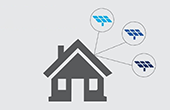Despite being the smallest state in the USA, Rhode Island certainly punches above its weight in terms of its solar policies. Rhode Island was ranked 29th in the country for installed solar capacity in 2020 – an impressive feat considering how much smaller it is than the 21 states it beat out.
The best way to compare your solar options and save money at the same time is by registering on the EnergySage Marketplace. When you compare quotes for solar panels on EnergySage's competitive solar marketplace, you can expect to see prices up to 20% lower than working with a single solar company. Read our updated article on the cost of solar panels to compare solar costs across states and by panel brand.
The top solar rebates, grants and tax exemptions in RI
As a resident of Rhode Island thinking about going solar, there are a few main state programs that you need to know about. Combined with the investment tax credit (ITC) from the federal government, these incentives help make your new solar energy system a great investment:
Small-scale solar grants
This solar grant program gives proud new solar owners a per watt grant via their installation company. Historically, RI homeowners have typically been able to save more than $5,000 on their installtion with this cash rebate offering.
Funds for the program are limited annually, and enrollment traditionally fills up quickly. You can confirm the current program status and availability of rebates on Rhode Island Commerce’s website.
Property and sales tax breaks
Thanks to the Residential Solar Energy Property Tax Exemption, your property taxes will not increase as a result of the value your new solar panels add to your home. Additionally, due to the Renewable Energy Products Sales and Use Tax Exemption, you will not have to pay any tax on your purchase of your new solar energy system. Think of it as buying your system at a duty-free store!
Net metering in Rhode Island
When you put solar panels on your roof, you want to make sure you get credit for all of the power your system generates. Luckily, Rhode Island has a net metering policy that credits you for the extra electricity your system produces, and allows you to use those credits when your system doesn’t generate enough power. Rhode Island Energy offers the top utility net metering program in Rhode Island.
Renewable Energy Growth: a key solar program
One of the state’s best solar incentive offers is Rhode Island Energy's Renewable Energy Growth (REG) program. Residential customers who choose to participate in this program will receive 28.75 cents for each kilowatt-hour (kWh) their solar panel system generates for the first 15 years of their system. The value of this offer is most clearly highlighted when compared to the regular retail rate of about 19 cents per kWh.
Those taking advantage of the REG incentive receive payments from Rhode Island Energy primarily via bill credits, and remaining earnings as cash payments. This is a feed-in-tariff program, meaning solar panel system owners who participate do not have net metering.
You can read about the REG incentive and payment structure in this article.
The federal solar tax credit
Don’t forget about federal solar incentives! With the investment tax credit (ITC), now referred to as the Residential Clean Energy Credit for residential systems, you can reduce the cost of your PV solar energy system by 30 percent. Keep in mind that the ITC applies only to those who buy their PV system outright (either with a cash purchase or a solar loan), and that you must have enough income for the tax credit to be meaningful (unless you’re a tax-exempt entity, in which case you might be eligible for a direct payment).









